Sustainable Tourism: Development, Planning, and Challenges Report
VerifiedAdded on 2023/01/12
|9
|2268
|46
Report
AI Summary
This report provides a comprehensive overview of sustainable tourism, examining its historical development and the evolution of its core principles. It explores the roles and functions of leading global organizations dedicated to promoting sustainable and responsible tourism practices, including the Destination Stewardship Centre and the Centre for Responsible Tourism. The report delves into the purpose and principles of tourism development and planning, emphasizing strategies to minimize adverse environmental and social impacts. It further analyzes the processes involved in tourism development and planning, addressing associated challenges such as taxation and security, and provides specific examples to illustrate these points. The report concludes by emphasizing the importance of sustainable tourism for economic growth, cultural preservation, and the overall well-being of both tourists and host communities. It also highlights the need for ongoing research, community involvement, and adherence to ethical standards within the industry.
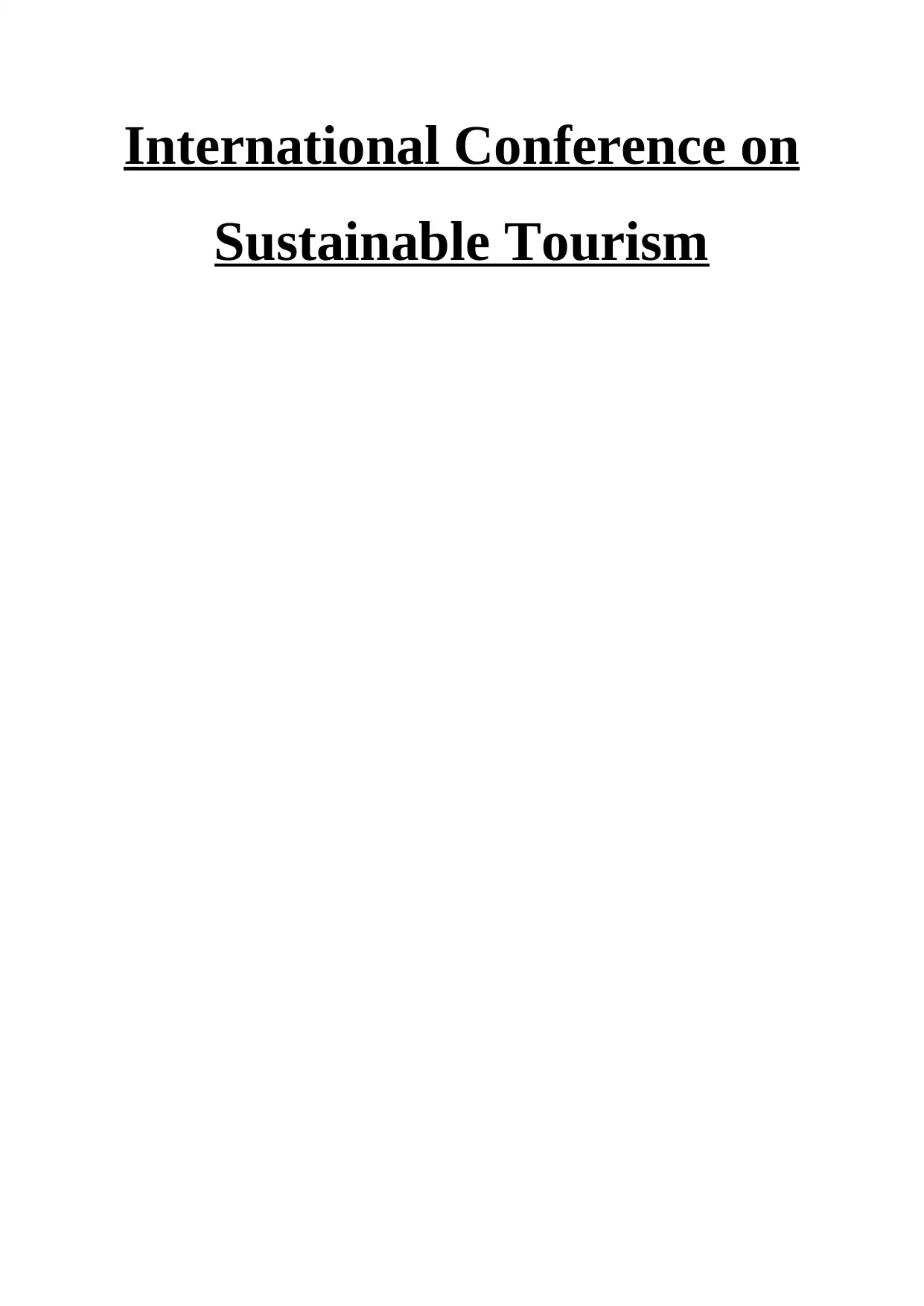
International Conference on
Sustainable Tourism
Sustainable Tourism
Paraphrase This Document
Need a fresh take? Get an instant paraphrase of this document with our AI Paraphraser
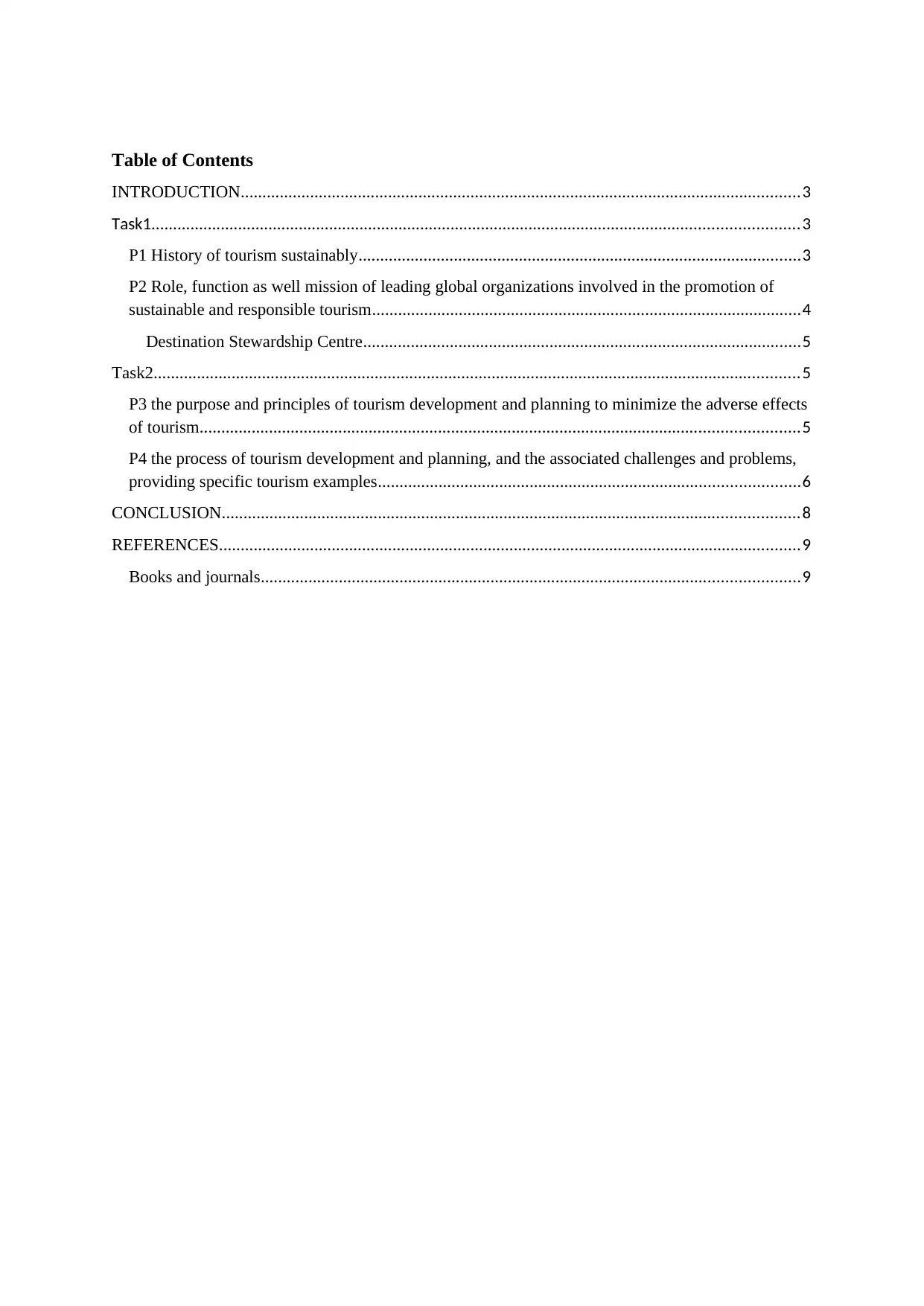
Table of Contents
INTRODUCTION.................................................................................................................................3
Task1.....................................................................................................................................................3
P1 History of tourism sustainably......................................................................................................3
P2 Role, function as well mission of leading global organizations involved in the promotion of
sustainable and responsible tourism...................................................................................................4
Destination Stewardship Centre.....................................................................................................5
Task2.....................................................................................................................................................5
P3 the purpose and principles of tourism development and planning to minimize the adverse effects
of tourism..........................................................................................................................................5
P4 the process of tourism development and planning, and the associated challenges and problems,
providing specific tourism examples.................................................................................................6
CONCLUSION.....................................................................................................................................8
REFERENCES......................................................................................................................................9
Books and journals............................................................................................................................9
INTRODUCTION.................................................................................................................................3
Task1.....................................................................................................................................................3
P1 History of tourism sustainably......................................................................................................3
P2 Role, function as well mission of leading global organizations involved in the promotion of
sustainable and responsible tourism...................................................................................................4
Destination Stewardship Centre.....................................................................................................5
Task2.....................................................................................................................................................5
P3 the purpose and principles of tourism development and planning to minimize the adverse effects
of tourism..........................................................................................................................................5
P4 the process of tourism development and planning, and the associated challenges and problems,
providing specific tourism examples.................................................................................................6
CONCLUSION.....................................................................................................................................8
REFERENCES......................................................................................................................................9
Books and journals............................................................................................................................9
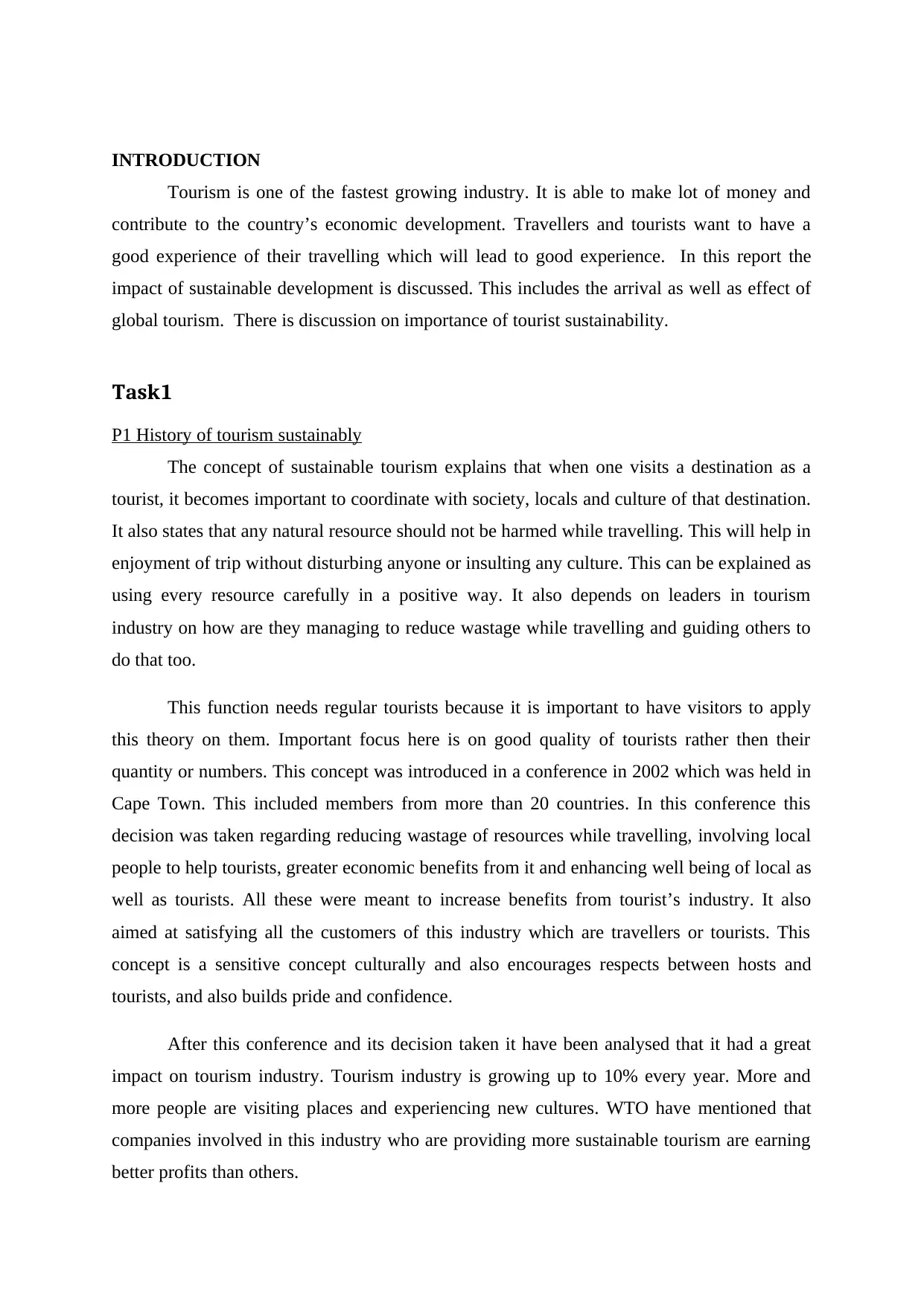
INTRODUCTION
Tourism is one of the fastest growing industry. It is able to make lot of money and
contribute to the country’s economic development. Travellers and tourists want to have a
good experience of their travelling which will lead to good experience. In this report the
impact of sustainable development is discussed. This includes the arrival as well as effect of
global tourism. There is discussion on importance of tourist sustainability.
Task1
P1 History of tourism sustainably
The concept of sustainable tourism explains that when one visits a destination as a
tourist, it becomes important to coordinate with society, locals and culture of that destination.
It also states that any natural resource should not be harmed while travelling. This will help in
enjoyment of trip without disturbing anyone or insulting any culture. This can be explained as
using every resource carefully in a positive way. It also depends on leaders in tourism
industry on how are they managing to reduce wastage while travelling and guiding others to
do that too.
This function needs regular tourists because it is important to have visitors to apply
this theory on them. Important focus here is on good quality of tourists rather then their
quantity or numbers. This concept was introduced in a conference in 2002 which was held in
Cape Town. This included members from more than 20 countries. In this conference this
decision was taken regarding reducing wastage of resources while travelling, involving local
people to help tourists, greater economic benefits from it and enhancing well being of local as
well as tourists. All these were meant to increase benefits from tourist’s industry. It also
aimed at satisfying all the customers of this industry which are travellers or tourists. This
concept is a sensitive concept culturally and also encourages respects between hosts and
tourists, and also builds pride and confidence.
After this conference and its decision taken it have been analysed that it had a great
impact on tourism industry. Tourism industry is growing up to 10% every year. More and
more people are visiting places and experiencing new cultures. WTO have mentioned that
companies involved in this industry who are providing more sustainable tourism are earning
better profits than others.
Tourism is one of the fastest growing industry. It is able to make lot of money and
contribute to the country’s economic development. Travellers and tourists want to have a
good experience of their travelling which will lead to good experience. In this report the
impact of sustainable development is discussed. This includes the arrival as well as effect of
global tourism. There is discussion on importance of tourist sustainability.
Task1
P1 History of tourism sustainably
The concept of sustainable tourism explains that when one visits a destination as a
tourist, it becomes important to coordinate with society, locals and culture of that destination.
It also states that any natural resource should not be harmed while travelling. This will help in
enjoyment of trip without disturbing anyone or insulting any culture. This can be explained as
using every resource carefully in a positive way. It also depends on leaders in tourism
industry on how are they managing to reduce wastage while travelling and guiding others to
do that too.
This function needs regular tourists because it is important to have visitors to apply
this theory on them. Important focus here is on good quality of tourists rather then their
quantity or numbers. This concept was introduced in a conference in 2002 which was held in
Cape Town. This included members from more than 20 countries. In this conference this
decision was taken regarding reducing wastage of resources while travelling, involving local
people to help tourists, greater economic benefits from it and enhancing well being of local as
well as tourists. All these were meant to increase benefits from tourist’s industry. It also
aimed at satisfying all the customers of this industry which are travellers or tourists. This
concept is a sensitive concept culturally and also encourages respects between hosts and
tourists, and also builds pride and confidence.
After this conference and its decision taken it have been analysed that it had a great
impact on tourism industry. Tourism industry is growing up to 10% every year. More and
more people are visiting places and experiencing new cultures. WTO have mentioned that
companies involved in this industry who are providing more sustainable tourism are earning
better profits than others.
⊘ This is a preview!⊘
Do you want full access?
Subscribe today to unlock all pages.

Trusted by 1+ million students worldwide
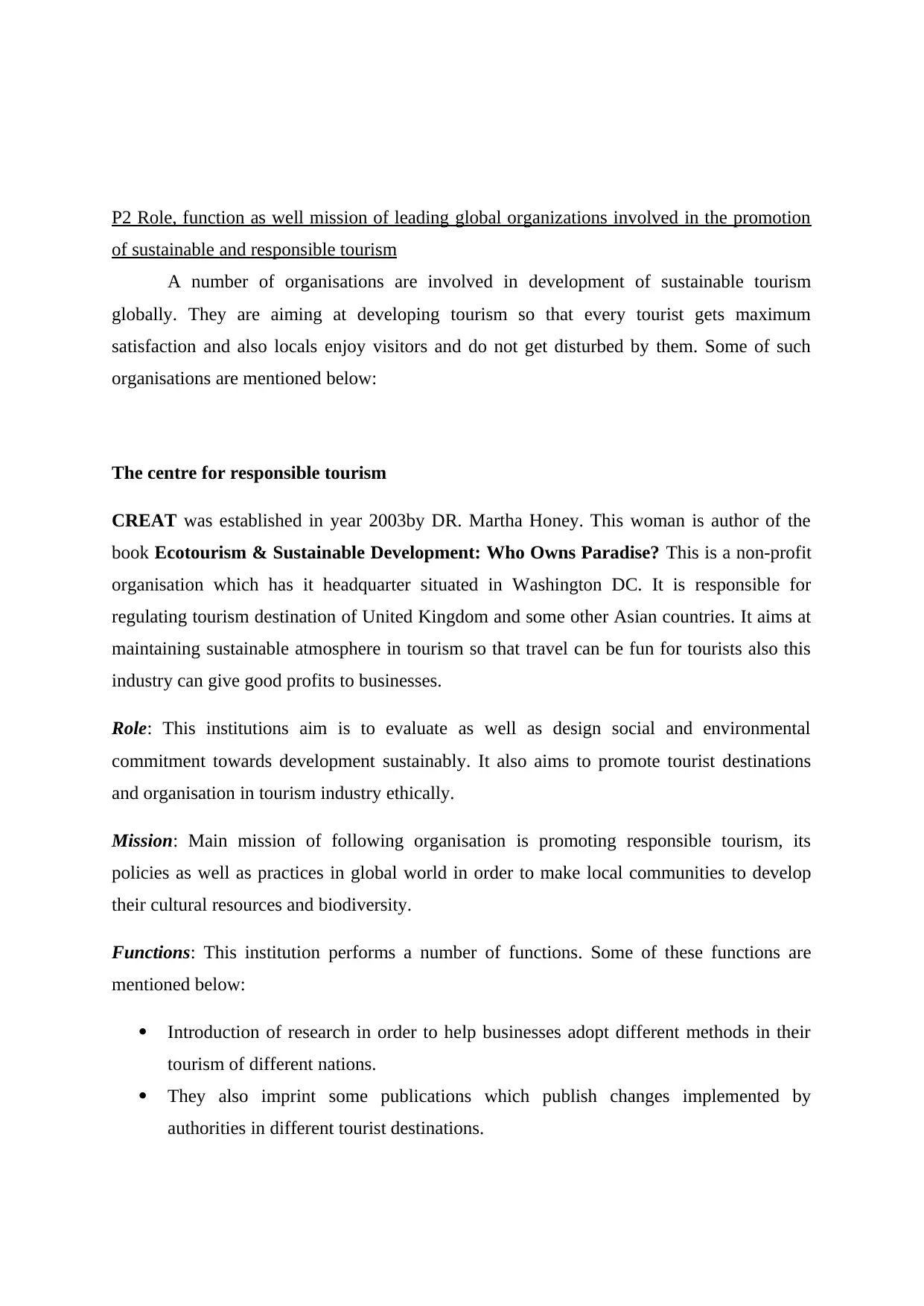
P2 Role, function as well mission of leading global organizations involved in the promotion
of sustainable and responsible tourism
A number of organisations are involved in development of sustainable tourism
globally. They are aiming at developing tourism so that every tourist gets maximum
satisfaction and also locals enjoy visitors and do not get disturbed by them. Some of such
organisations are mentioned below:
The centre for responsible tourism
CREAT was established in year 2003by DR. Martha Honey. This woman is author of the
book Ecotourism & Sustainable Development: Who Owns Paradise? This is a non-profit
organisation which has it headquarter situated in Washington DC. It is responsible for
regulating tourism destination of United Kingdom and some other Asian countries. It aims at
maintaining sustainable atmosphere in tourism so that travel can be fun for tourists also this
industry can give good profits to businesses.
Role: This institutions aim is to evaluate as well as design social and environmental
commitment towards development sustainably. It also aims to promote tourist destinations
and organisation in tourism industry ethically.
Mission: Main mission of following organisation is promoting responsible tourism, its
policies as well as practices in global world in order to make local communities to develop
their cultural resources and biodiversity.
Functions: This institution performs a number of functions. Some of these functions are
mentioned below:
Introduction of research in order to help businesses adopt different methods in their
tourism of different nations.
They also imprint some publications which publish changes implemented by
authorities in different tourist destinations.
of sustainable and responsible tourism
A number of organisations are involved in development of sustainable tourism
globally. They are aiming at developing tourism so that every tourist gets maximum
satisfaction and also locals enjoy visitors and do not get disturbed by them. Some of such
organisations are mentioned below:
The centre for responsible tourism
CREAT was established in year 2003by DR. Martha Honey. This woman is author of the
book Ecotourism & Sustainable Development: Who Owns Paradise? This is a non-profit
organisation which has it headquarter situated in Washington DC. It is responsible for
regulating tourism destination of United Kingdom and some other Asian countries. It aims at
maintaining sustainable atmosphere in tourism so that travel can be fun for tourists also this
industry can give good profits to businesses.
Role: This institutions aim is to evaluate as well as design social and environmental
commitment towards development sustainably. It also aims to promote tourist destinations
and organisation in tourism industry ethically.
Mission: Main mission of following organisation is promoting responsible tourism, its
policies as well as practices in global world in order to make local communities to develop
their cultural resources and biodiversity.
Functions: This institution performs a number of functions. Some of these functions are
mentioned below:
Introduction of research in order to help businesses adopt different methods in their
tourism of different nations.
They also imprint some publications which publish changes implemented by
authorities in different tourist destinations.
Paraphrase This Document
Need a fresh take? Get an instant paraphrase of this document with our AI Paraphraser
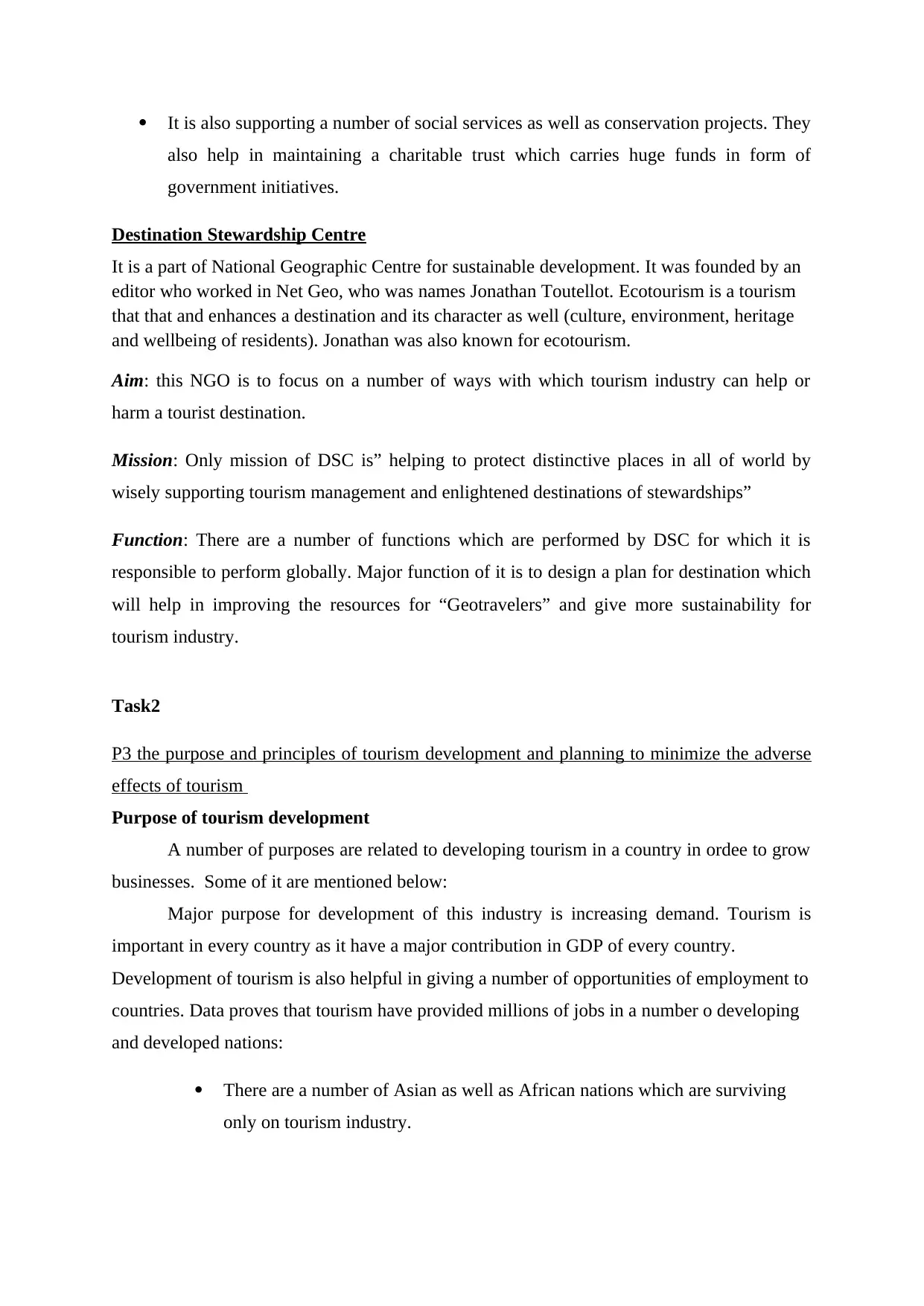
It is also supporting a number of social services as well as conservation projects. They
also help in maintaining a charitable trust which carries huge funds in form of
government initiatives.
Destination Stewardship Centre
It is a part of National Geographic Centre for sustainable development. It was founded by an
editor who worked in Net Geo, who was names Jonathan Toutellot. Ecotourism is a tourism
that that and enhances a destination and its character as well (culture, environment, heritage
and wellbeing of residents). Jonathan was also known for ecotourism.
Aim: this NGO is to focus on a number of ways with which tourism industry can help or
harm a tourist destination.
Mission: Only mission of DSC is” helping to protect distinctive places in all of world by
wisely supporting tourism management and enlightened destinations of stewardships”
Function: There are a number of functions which are performed by DSC for which it is
responsible to perform globally. Major function of it is to design a plan for destination which
will help in improving the resources for “Geotravelers” and give more sustainability for
tourism industry.
Task2
P3 the purpose and principles of tourism development and planning to minimize the adverse
effects of tourism
Purpose of tourism development
A number of purposes are related to developing tourism in a country in ordee to grow
businesses. Some of it are mentioned below:
Major purpose for development of this industry is increasing demand. Tourism is
important in every country as it have a major contribution in GDP of every country.
Development of tourism is also helpful in giving a number of opportunities of employment to
countries. Data proves that tourism have provided millions of jobs in a number o developing
and developed nations:
There are a number of Asian as well as African nations which are surviving
only on tourism industry.
also help in maintaining a charitable trust which carries huge funds in form of
government initiatives.
Destination Stewardship Centre
It is a part of National Geographic Centre for sustainable development. It was founded by an
editor who worked in Net Geo, who was names Jonathan Toutellot. Ecotourism is a tourism
that that and enhances a destination and its character as well (culture, environment, heritage
and wellbeing of residents). Jonathan was also known for ecotourism.
Aim: this NGO is to focus on a number of ways with which tourism industry can help or
harm a tourist destination.
Mission: Only mission of DSC is” helping to protect distinctive places in all of world by
wisely supporting tourism management and enlightened destinations of stewardships”
Function: There are a number of functions which are performed by DSC for which it is
responsible to perform globally. Major function of it is to design a plan for destination which
will help in improving the resources for “Geotravelers” and give more sustainability for
tourism industry.
Task2
P3 the purpose and principles of tourism development and planning to minimize the adverse
effects of tourism
Purpose of tourism development
A number of purposes are related to developing tourism in a country in ordee to grow
businesses. Some of it are mentioned below:
Major purpose for development of this industry is increasing demand. Tourism is
important in every country as it have a major contribution in GDP of every country.
Development of tourism is also helpful in giving a number of opportunities of employment to
countries. Data proves that tourism have provided millions of jobs in a number o developing
and developed nations:
There are a number of Asian as well as African nations which are surviving
only on tourism industry.
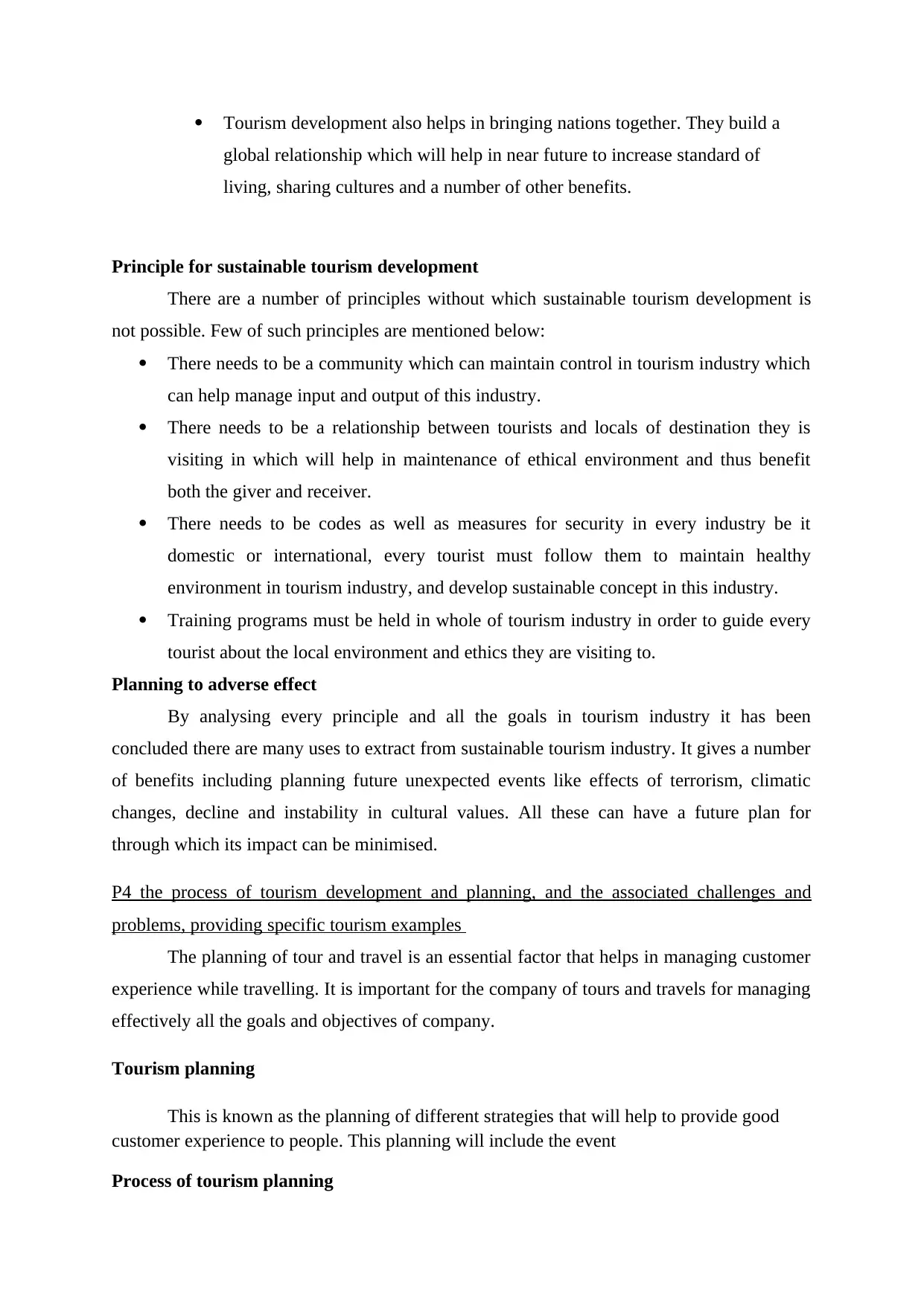
Tourism development also helps in bringing nations together. They build a
global relationship which will help in near future to increase standard of
living, sharing cultures and a number of other benefits.
Principle for sustainable tourism development
There are a number of principles without which sustainable tourism development is
not possible. Few of such principles are mentioned below:
There needs to be a community which can maintain control in tourism industry which
can help manage input and output of this industry.
There needs to be a relationship between tourists and locals of destination they is
visiting in which will help in maintenance of ethical environment and thus benefit
both the giver and receiver.
There needs to be codes as well as measures for security in every industry be it
domestic or international, every tourist must follow them to maintain healthy
environment in tourism industry, and develop sustainable concept in this industry.
Training programs must be held in whole of tourism industry in order to guide every
tourist about the local environment and ethics they are visiting to.
Planning to adverse effect
By analysing every principle and all the goals in tourism industry it has been
concluded there are many uses to extract from sustainable tourism industry. It gives a number
of benefits including planning future unexpected events like effects of terrorism, climatic
changes, decline and instability in cultural values. All these can have a future plan for
through which its impact can be minimised.
P4 the process of tourism development and planning, and the associated challenges and
problems, providing specific tourism examples
The planning of tour and travel is an essential factor that helps in managing customer
experience while travelling. It is important for the company of tours and travels for managing
effectively all the goals and objectives of company.
Tourism planning
This is known as the planning of different strategies that will help to provide good
customer experience to people. This planning will include the event
Process of tourism planning
global relationship which will help in near future to increase standard of
living, sharing cultures and a number of other benefits.
Principle for sustainable tourism development
There are a number of principles without which sustainable tourism development is
not possible. Few of such principles are mentioned below:
There needs to be a community which can maintain control in tourism industry which
can help manage input and output of this industry.
There needs to be a relationship between tourists and locals of destination they is
visiting in which will help in maintenance of ethical environment and thus benefit
both the giver and receiver.
There needs to be codes as well as measures for security in every industry be it
domestic or international, every tourist must follow them to maintain healthy
environment in tourism industry, and develop sustainable concept in this industry.
Training programs must be held in whole of tourism industry in order to guide every
tourist about the local environment and ethics they are visiting to.
Planning to adverse effect
By analysing every principle and all the goals in tourism industry it has been
concluded there are many uses to extract from sustainable tourism industry. It gives a number
of benefits including planning future unexpected events like effects of terrorism, climatic
changes, decline and instability in cultural values. All these can have a future plan for
through which its impact can be minimised.
P4 the process of tourism development and planning, and the associated challenges and
problems, providing specific tourism examples
The planning of tour and travel is an essential factor that helps in managing customer
experience while travelling. It is important for the company of tours and travels for managing
effectively all the goals and objectives of company.
Tourism planning
This is known as the planning of different strategies that will help to provide good
customer experience to people. This planning will include the event
Process of tourism planning
⊘ This is a preview!⊘
Do you want full access?
Subscribe today to unlock all pages.

Trusted by 1+ million students worldwide
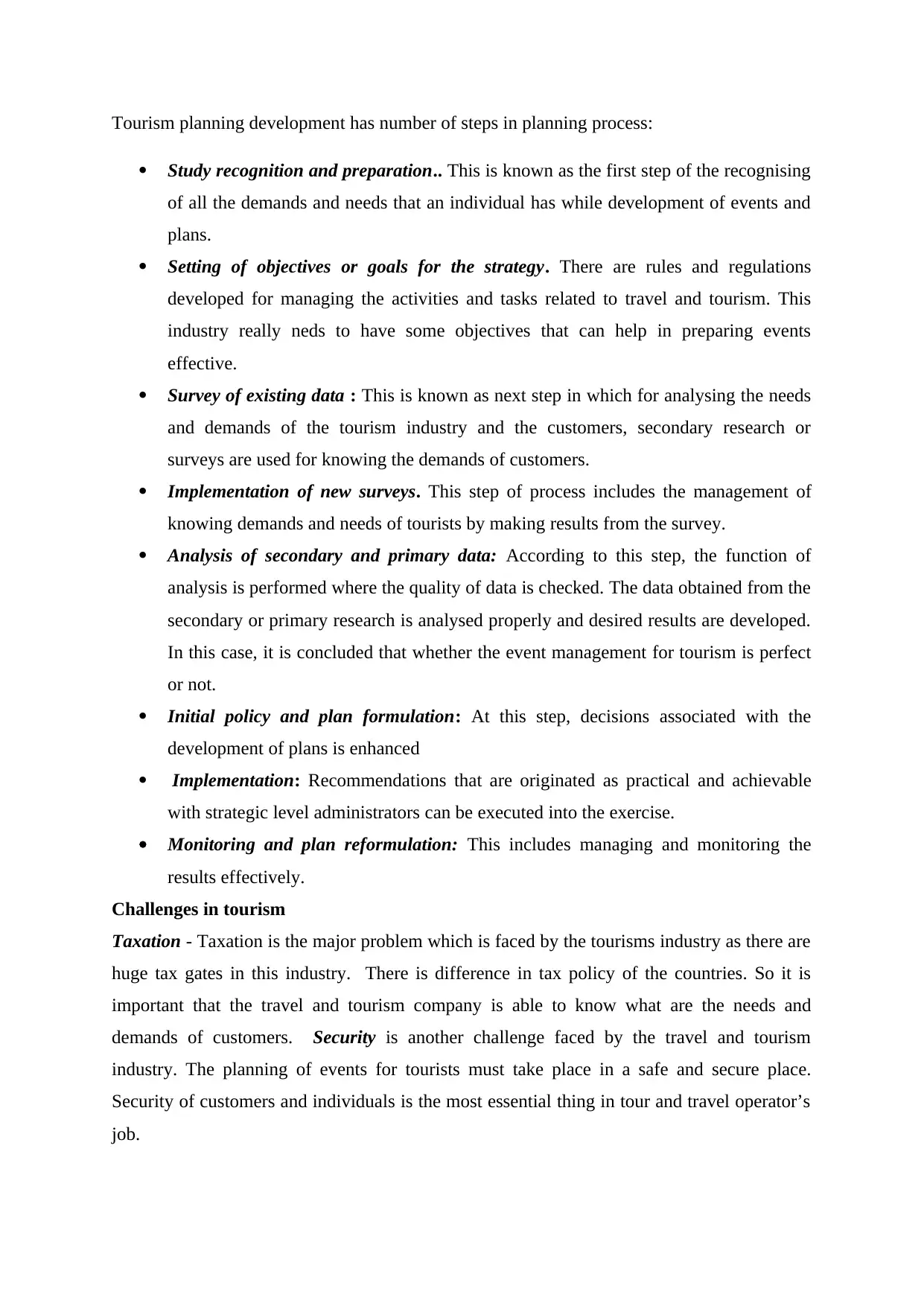
Tourism planning development has number of steps in planning process:
Study recognition and preparation.. This is known as the first step of the recognising
of all the demands and needs that an individual has while development of events and
plans.
Setting of objectives or goals for the strategy. There are rules and regulations
developed for managing the activities and tasks related to travel and tourism. This
industry really neds to have some objectives that can help in preparing events
effective.
Survey of existing data : This is known as next step in which for analysing the needs
and demands of the tourism industry and the customers, secondary research or
surveys are used for knowing the demands of customers.
Implementation of new surveys. This step of process includes the management of
knowing demands and needs of tourists by making results from the survey.
Analysis of secondary and primary data: According to this step, the function of
analysis is performed where the quality of data is checked. The data obtained from the
secondary or primary research is analysed properly and desired results are developed.
In this case, it is concluded that whether the event management for tourism is perfect
or not.
Initial policy and plan formulation: At this step, decisions associated with the
development of plans is enhanced
Implementation: Recommendations that are originated as practical and achievable
with strategic level administrators can be executed into the exercise.
Monitoring and plan reformulation: This includes managing and monitoring the
results effectively.
Challenges in tourism
Taxation - Taxation is the major problem which is faced by the tourisms industry as there are
huge tax gates in this industry. There is difference in tax policy of the countries. So it is
important that the travel and tourism company is able to know what are the needs and
demands of customers. Security is another challenge faced by the travel and tourism
industry. The planning of events for tourists must take place in a safe and secure place.
Security of customers and individuals is the most essential thing in tour and travel operator’s
job.
Study recognition and preparation.. This is known as the first step of the recognising
of all the demands and needs that an individual has while development of events and
plans.
Setting of objectives or goals for the strategy. There are rules and regulations
developed for managing the activities and tasks related to travel and tourism. This
industry really neds to have some objectives that can help in preparing events
effective.
Survey of existing data : This is known as next step in which for analysing the needs
and demands of the tourism industry and the customers, secondary research or
surveys are used for knowing the demands of customers.
Implementation of new surveys. This step of process includes the management of
knowing demands and needs of tourists by making results from the survey.
Analysis of secondary and primary data: According to this step, the function of
analysis is performed where the quality of data is checked. The data obtained from the
secondary or primary research is analysed properly and desired results are developed.
In this case, it is concluded that whether the event management for tourism is perfect
or not.
Initial policy and plan formulation: At this step, decisions associated with the
development of plans is enhanced
Implementation: Recommendations that are originated as practical and achievable
with strategic level administrators can be executed into the exercise.
Monitoring and plan reformulation: This includes managing and monitoring the
results effectively.
Challenges in tourism
Taxation - Taxation is the major problem which is faced by the tourisms industry as there are
huge tax gates in this industry. There is difference in tax policy of the countries. So it is
important that the travel and tourism company is able to know what are the needs and
demands of customers. Security is another challenge faced by the travel and tourism
industry. The planning of events for tourists must take place in a safe and secure place.
Security of customers and individuals is the most essential thing in tour and travel operator’s
job.
Paraphrase This Document
Need a fresh take? Get an instant paraphrase of this document with our AI Paraphraser
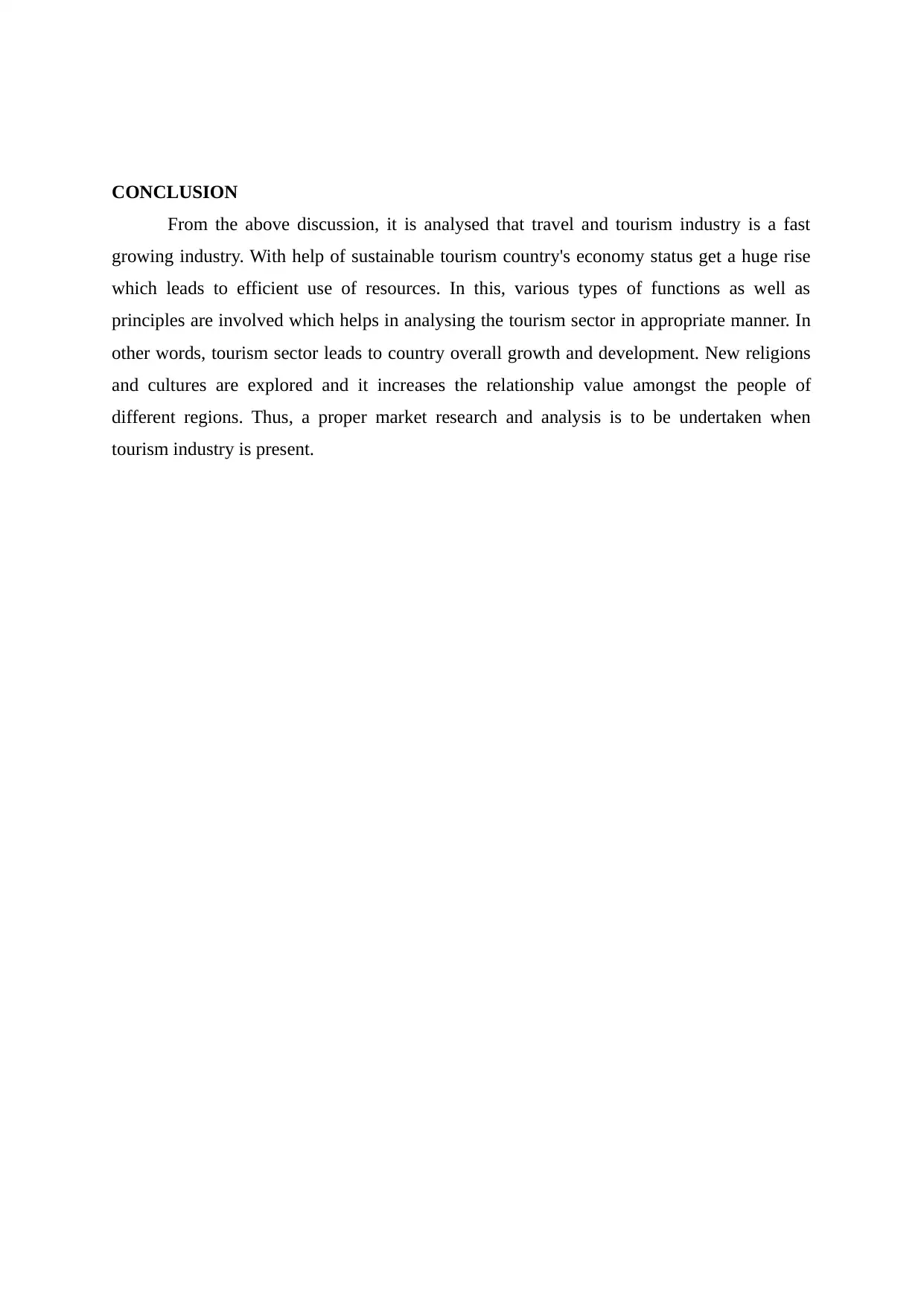
CONCLUSION
From the above discussion, it is analysed that travel and tourism industry is a fast
growing industry. With help of sustainable tourism country's economy status get a huge rise
which leads to efficient use of resources. In this, various types of functions as well as
principles are involved which helps in analysing the tourism sector in appropriate manner. In
other words, tourism sector leads to country overall growth and development. New religions
and cultures are explored and it increases the relationship value amongst the people of
different regions. Thus, a proper market research and analysis is to be undertaken when
tourism industry is present.
From the above discussion, it is analysed that travel and tourism industry is a fast
growing industry. With help of sustainable tourism country's economy status get a huge rise
which leads to efficient use of resources. In this, various types of functions as well as
principles are involved which helps in analysing the tourism sector in appropriate manner. In
other words, tourism sector leads to country overall growth and development. New religions
and cultures are explored and it increases the relationship value amongst the people of
different regions. Thus, a proper market research and analysis is to be undertaken when
tourism industry is present.
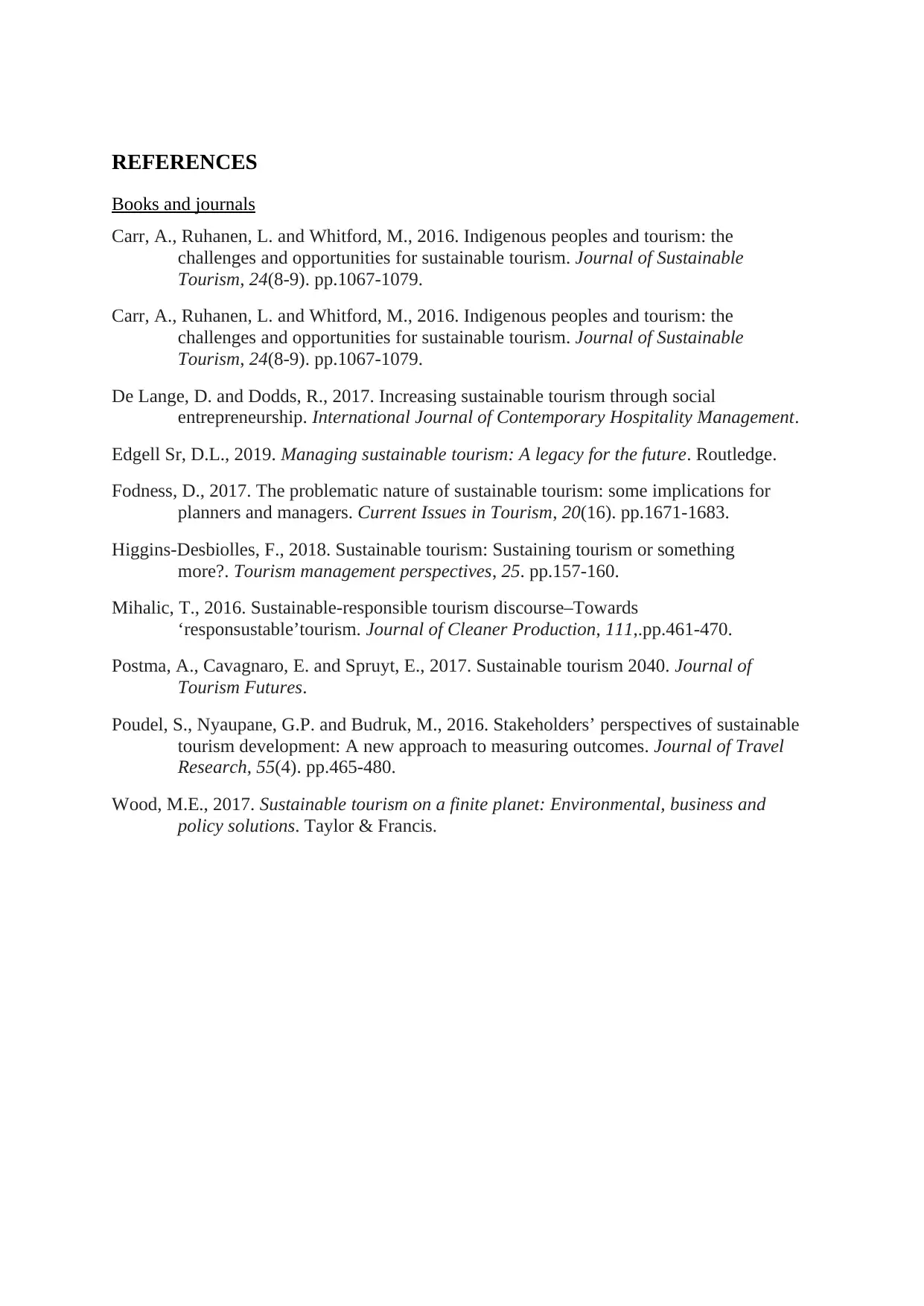
REFERENCES
Books and journals
Carr, A., Ruhanen, L. and Whitford, M., 2016. Indigenous peoples and tourism: the
challenges and opportunities for sustainable tourism. Journal of Sustainable
Tourism, 24(8-9). pp.1067-1079.
Carr, A., Ruhanen, L. and Whitford, M., 2016. Indigenous peoples and tourism: the
challenges and opportunities for sustainable tourism. Journal of Sustainable
Tourism, 24(8-9). pp.1067-1079.
De Lange, D. and Dodds, R., 2017. Increasing sustainable tourism through social
entrepreneurship. International Journal of Contemporary Hospitality Management.
Edgell Sr, D.L., 2019. Managing sustainable tourism: A legacy for the future. Routledge.
Fodness, D., 2017. The problematic nature of sustainable tourism: some implications for
planners and managers. Current Issues in Tourism, 20(16). pp.1671-1683.
Higgins-Desbiolles, F., 2018. Sustainable tourism: Sustaining tourism or something
more?. Tourism management perspectives, 25. pp.157-160.
Mihalic, T., 2016. Sustainable-responsible tourism discourse–Towards
‘responsustable’tourism. Journal of Cleaner Production, 111,.pp.461-470.
Postma, A., Cavagnaro, E. and Spruyt, E., 2017. Sustainable tourism 2040. Journal of
Tourism Futures.
Poudel, S., Nyaupane, G.P. and Budruk, M., 2016. Stakeholders’ perspectives of sustainable
tourism development: A new approach to measuring outcomes. Journal of Travel
Research, 55(4). pp.465-480.
Wood, M.E., 2017. Sustainable tourism on a finite planet: Environmental, business and
policy solutions. Taylor & Francis.
Books and journals
Carr, A., Ruhanen, L. and Whitford, M., 2016. Indigenous peoples and tourism: the
challenges and opportunities for sustainable tourism. Journal of Sustainable
Tourism, 24(8-9). pp.1067-1079.
Carr, A., Ruhanen, L. and Whitford, M., 2016. Indigenous peoples and tourism: the
challenges and opportunities for sustainable tourism. Journal of Sustainable
Tourism, 24(8-9). pp.1067-1079.
De Lange, D. and Dodds, R., 2017. Increasing sustainable tourism through social
entrepreneurship. International Journal of Contemporary Hospitality Management.
Edgell Sr, D.L., 2019. Managing sustainable tourism: A legacy for the future. Routledge.
Fodness, D., 2017. The problematic nature of sustainable tourism: some implications for
planners and managers. Current Issues in Tourism, 20(16). pp.1671-1683.
Higgins-Desbiolles, F., 2018. Sustainable tourism: Sustaining tourism or something
more?. Tourism management perspectives, 25. pp.157-160.
Mihalic, T., 2016. Sustainable-responsible tourism discourse–Towards
‘responsustable’tourism. Journal of Cleaner Production, 111,.pp.461-470.
Postma, A., Cavagnaro, E. and Spruyt, E., 2017. Sustainable tourism 2040. Journal of
Tourism Futures.
Poudel, S., Nyaupane, G.P. and Budruk, M., 2016. Stakeholders’ perspectives of sustainable
tourism development: A new approach to measuring outcomes. Journal of Travel
Research, 55(4). pp.465-480.
Wood, M.E., 2017. Sustainable tourism on a finite planet: Environmental, business and
policy solutions. Taylor & Francis.
⊘ This is a preview!⊘
Do you want full access?
Subscribe today to unlock all pages.

Trusted by 1+ million students worldwide
1 out of 9
Related Documents
Your All-in-One AI-Powered Toolkit for Academic Success.
+13062052269
info@desklib.com
Available 24*7 on WhatsApp / Email
![[object Object]](/_next/static/media/star-bottom.7253800d.svg)
Unlock your academic potential
Copyright © 2020–2026 A2Z Services. All Rights Reserved. Developed and managed by ZUCOL.





